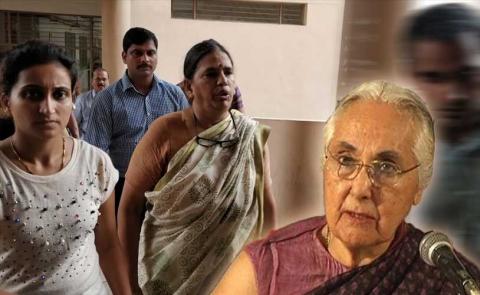Pune (Maharashtra): A Pune Special Court on Saturday sent human rights activists Vernon S. Gonsalves and Arun T. Ferreira to police custody till November 6 for their involvement in the Koregaon-Bhima caste riots on January 1, officials said here.
The development came a day after the Special Judge of the Unlawful Activities (Prevention) Act Court, K.D. Vadane, passed a common order on Friday evening declining the bail applications of Sudha Bharadwaj, Gonsalves and Ferreira in the case filed against them by the Vishrambaug police station here.
Shortly after their bail pleas were rejected, Gonsalves was arrested from his Pune home and Ferreira from Thane. They were under 'house arrest' for almost two months following A Supreme Court directive.
A police team has proceeded to Faridabad, Haryana, to nab Bharadwaj and she is likely to be brought to Pune soon after completing the relevant formalities.
The duo, along with Bharadwaj and others, are accused in the Elgar Parishad of December 31, 2017, leading to the Koregaon-Bhima caste riots of January 1 this year.
In the remand plea, the Pune Police have said that Gonsalves and Ferreira were entrusted with recruitment through the Radical Students Union (RSU) on behalf of the banned Communist Party of India (Maoist) and sending them to the guerrilla warfare zones. The police said they wanted to probe how many and who had been hired for these causes.
The police also need to investigate the sources of funds and for what activities the monies were being used by the two accused.
The remand application claimed that the police have unearthed a major conspiracy to 'overthrow' the democratically elected Indian government with violent means and they wanted to probe this further.
They said that Gonsalves was in regular contact with another co-accused in the case, Sudhir Dhawale, and wanted to probe what were the reasons for this, examine electronic devices in their (Gonsalves-Ferreira) presence, probe their financial and bank dealings, documents, emails, their social media accounts and mobile call records.
In August, the Pune Police had raided and arrested five accused including Bharadwaj, Gonsalves, Ferreira, Gautam Navlakha (now released) and P. Varavara Rao (currently under house arrest in Hyderabad).
Earlier in June, the Pune Police had nabbed activists Rona Wilson, Sudhir Dhawale, Shoma Sen, Surendra Gadling and Mahesh Raut in the Koregaon-Bhima case.
Besides the Koregaon-Bhima violence, the police said that the accused harboured links with Maoist and Kashmiri terror groups, were hatching a conspiracy to carry out a high-level political assassination in a 'Rajiv Gandhi-style operation', procuring arms and ammunition, seeking to incite disturbances and violence in the country to topple the democratically elected government.
SC rejects Romila Thapar's plea
The Supreme Court has dismissed a plea by historian Romila Thapar seeking recall of its judgment by which it had refused to interfere in the arrest of five rights activists accused of having links with outlawed CPI (Maoists).
The top court had also declined to set up an SIT, allowing the Pune police to go ahead with its probe in the Bhima-Koregaon case.
Rejecting the review plea, a Bench of Chief Justice Ranjan Gogoi, Justice A.K. Khanwilkar and Justice D.Y. Chandrachud on Friday said, "In our opinion, no case for a review of judgment is made out. The review petitions are accordingly dismissed."
The bench, considering the review plea in their chamber, also declined a prayer for an oral hearing of the review petition.
The top court by 2:1 majority judgment on September 28 had said: "Upon perusal of the material (given by the investigating agency), we are of the opinion that it is not a case of arrest because of mere dissenting views expressed or difference in the political ideology of the named accused, but concerning their link with the members of banned organisation and its activities."
The five activists -- Sudha Bhardwaj, Varavara Rao, Gautam Navlakha, Vernon Gonsalves and Arun Ferreira -- were arrested on August 28 from various cities on charges of having Maoist links.
Justice Chandrachud in his dissenting judgment had said, "The court has to be vigilant in the exercise of its jurisdiction under Article 32 of the Indian Constitution to ensure that liberty is not sacrificed at the altar of conjectures. Individuals who assert causes which may be unpopular to the echelons of power are yet entitled to the freedoms which are guaranteed by the Constitution."
